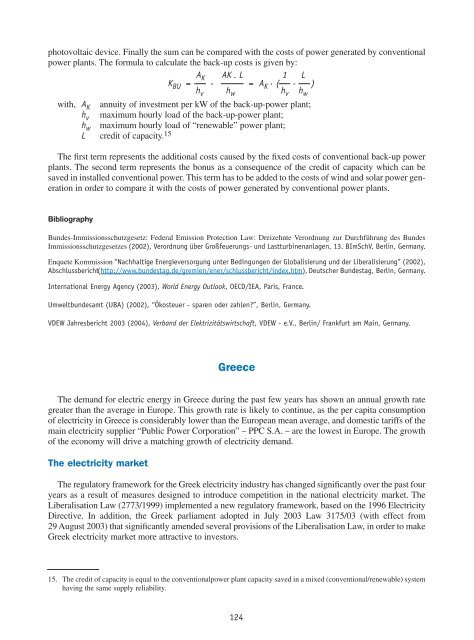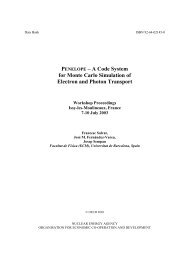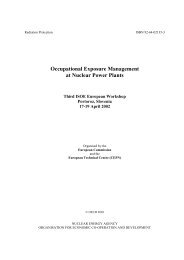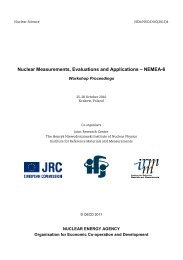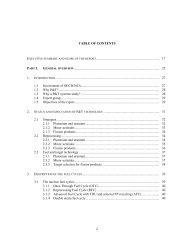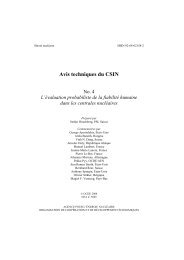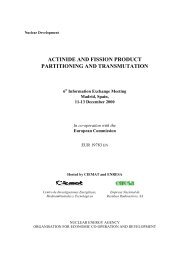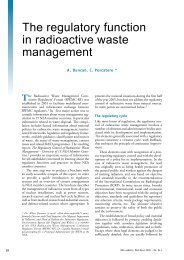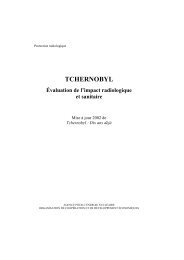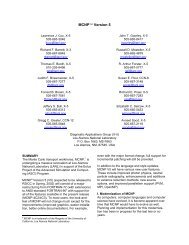Projected Costs of Generating Electricity - OECD Nuclear Energy ...
Projected Costs of Generating Electricity - OECD Nuclear Energy ...
Projected Costs of Generating Electricity - OECD Nuclear Energy ...
You also want an ePaper? Increase the reach of your titles
YUMPU automatically turns print PDFs into web optimized ePapers that Google loves.
photovoltaic device. Finally the sum can be compared with the costs <strong>of</strong> power generated by conventional<br />
power plants. The formula to calculate the back-up costs is given by:<br />
K BU = A K AK . L<br />
- = AK . ( 1 - L )<br />
h v h w h v h w<br />
with, A K annuity <strong>of</strong> investment per kW <strong>of</strong> the back-up-power plant;<br />
h v maximum hourly load <strong>of</strong> the back-up-power plant;<br />
h w maximum hourly load <strong>of</strong> “renewable” power plant;<br />
L credit <strong>of</strong> capacity. 15<br />
The first term represents the additional costs caused by the fixed costs <strong>of</strong> conventional back-up power<br />
plants. The second term represents the bonus as a consequence <strong>of</strong> the credit <strong>of</strong> capacity which can be<br />
saved in installed conventional power. This term has to be added to the costs <strong>of</strong> wind and solar power generation<br />
in order to compare it with the costs <strong>of</strong> power generated by conventional power plants.<br />
Bibliography<br />
Bundes-Immissionsschutzgesetz: Federal Emission Protection Law: Dreizehnte Verordnung zur Durchführung des Bundes<br />
Immissionsschutzgesetzes (2002), Verordnung über Großfeuerungs- und Lastturbinenanlagen, 13. BImSchV, Berlin, Germany.<br />
Enquete Kommission “Nachhaltige Energieversorgung unter Bedingungen der Globalisierung und der Liberalisierung” (2002),<br />
Abschlussbericht(http://www.bundestag.de/gremien/ener/schlussbericht/index.htm), Deutscher Bundestag, Berlin, Germany.<br />
International <strong>Energy</strong> Agency (2003), World <strong>Energy</strong> Outlook, <strong>OECD</strong>/IEA, Paris, France.<br />
Umweltbundesamt (UBA) (2002), “Ökosteuer - sparen oder zahlen?”, Berlin, Germany.<br />
VDEW Jahresbericht 2003 (2004), Verband der Elektrizitätswirtschaft, VDEW - e.V., Berlin/ Frankfurt am Main, Germany.<br />
Greece<br />
The demand for electric energy in Greece during the past few years has shown an annual growth rate<br />
greater than the average in Europe. This growth rate is likely to continue, as the per capita consumption<br />
<strong>of</strong> electricity in Greece is considerably lower than the European mean average, and domestic tariffs <strong>of</strong> the<br />
main electricity supplier “Public Power Corporation” – PPC S.A. – are the lowest in Europe. The growth<br />
<strong>of</strong> the economy will drive a matching growth <strong>of</strong> electricity demand.<br />
The electricity market<br />
The regulatory framework for the Greek electricity industry has changed significantly over the past four<br />
years as a result <strong>of</strong> measures designed to introduce competition in the national electricity market. The<br />
Liberalisation Law (2773/1999) implemented a new regulatory framework, based on the 1996 <strong>Electricity</strong><br />
Directive. In addition, the Greek parliament adopted in July 2003 Law 3175/03 (with effect from<br />
29 August 2003) that significantly amended several provisions <strong>of</strong> the Liberalisation Law, in order to make<br />
Greek electricity market more attractive to investors.<br />
15. The credit <strong>of</strong> capacity is equal to the conventionalpower plant capacity saved in a mixed (conventional/renewable) system<br />
having the same supply reliability.<br />
124


